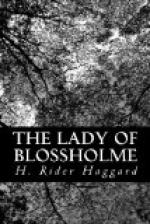To their captain, one Jeffreys, Jacob showed the King’s commission, revealing who they were. Seeing that it commanded all his Grace’s officers and servants to do them service, this Captain Jeffreys said that he would give them escort until their roads separated. So next day they went on again. The company was not pleasant, for the men, of whom there were about a hundred, proved rough fellows, still, having been warned that he who insulted or laid a finger on them should be hanged, they did them no harm. It was well, indeed, that they had their protection, for they found the country through which they passed up in arms, and were more than once threatened by mobs of peasants, led by priests, who would have attacked them had they dared.
For two days they travelled thus with Captain Jeffreys, coming on the evening of the second to Peterborough, where they found lodgings at an inn. When they rose the next morning, however, it was to discover that Jeffreys and his men had already gone, leaving a message to say that he had received urgent orders to push on to Lincoln.
Now once more they told their old tale, declaring that they were citizens of Boston, and having learned that the Fens were peaceful, perhaps because so few people lived in them, started forward by themselves under the guidance of Bolle, who had often journeyed through that country, buying or selling cattle for the monks. An ill land was it to travel in also in that wet autumn, seeing that in many places the floods were out and the tracks were like a quagmire. The first night they spent in a marshman’s hut, listening to the pouring rain and fearing fever and ague, especially for the boy. The next day, by good fortune, they reached higher land and slept at a tavern.
Here they were visited by rude men, who, being of the party of rebellion, sought to know their business. For a while things were dangerous, but Bolle, who could talk their own dialect, showed that they were scarcely to be feared who travelled with two women and a babe, adding that he was a lay-brother of Blossholme Abbey disguised as a serving-man for dread of the King’s party. Jacob Smith also called for ale and drank with them to the success of the Pilgrimage of Grace, as their revolt was named.
In this way they disarmed suspicion with one tale and another. Moreover, they heard that as yet the country round Blossholme remained undisturbed, although it was said that the Abbot had fortified the Abbey and stored it with provisions. He himself was with the leaders of the revolt in the neighbourhood of Lincoln, but he had done this that he might have a strong place to fall back on.
So in the end the men went away full of strong beer, and that danger passed by.




